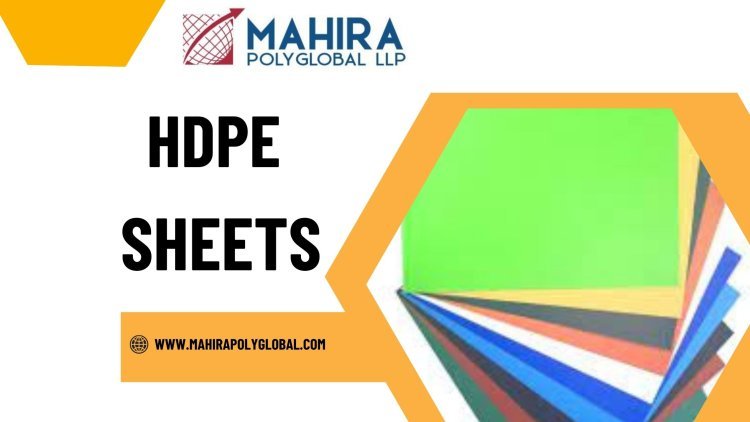Comparing HDPE Sheets with Other Plastic Materials: What You Need to Know
Comparing HDPE Sheets with Other Plastic Materials: What You Need to Know

In the world of materials science, High-Density Polyethylene (HDPE) sheets are increasingly gaining recognition for their unique properties and diverse applications. However, with a wide range of plastic materials available, it's crucial to understand how HDPE sheets compare with other plastics, such as Polypropylene (PP), Polyvinyl Chloride (PVC), and Acrylonitrile Butadiene Styrene (ABS).
This article will delve into the characteristics, advantages, and applications of HDPE sheets, while also highlighting their differences from other plastic materials. Additionally, we will touch upon pricing factors, including HDPE Sheets Price from suppliers like Mahira Polyglobal LLP.
What are HDPE Sheets?
HDPE sheets are made from high-density polyethylene, a type of thermoplastic known for its strength, durability, and resistance to impact, chemicals, and moisture. Commonly used in various industries, HDPE sheets are favored for applications requiring robust and reliable materials.
Key Properties of HDPE Sheets
- Durability: HDPE sheets are highly resistant to wear and tear, making them suitable for long-term use.
- Chemical Resistance: They can withstand exposure to various chemicals, including acids and bases.
- Moisture Resistance: HDPE sheets do not absorb water, making them ideal for outdoor applications.
- Lightweight: Despite their strength, HDPE sheets are relatively lightweight, which helps reduce shipping costs and ease installation.
Comparing HDPE Sheets with Other Plastic Materials
1. HDPE vs. Polypropylene (PP)
Properties:
- Chemical Resistance: Both HDPE and PP exhibit excellent resistance to chemicals. However, PP has a higher melting point, making it suitable for applications requiring thermal stability.
- Flexibility: PP is more flexible than HDPE, which can be an advantage in applications where bending is required.
- Weight: HDPE is denser and, therefore, heavier compared to PP.
Applications:
- HDPE: Commonly used in packaging, construction, and environmental applications like liners for landfills.
- PP: Often found in food containers, automotive parts, and medical supplies.
Price: The HDPE sheets price can be slightly higher than PP due to its strength and durability, but prices vary based on suppliers and market conditions.
2. HDPE vs. Polyvinyl Chloride (PVC)
Properties:
- Durability: While both materials are durable, HDPE is generally more resistant to impact and weathering.
- Chemical Resistance: HDPE has superior chemical resistance compared to PVC, especially when it comes to acids and alkalis.
- Brittleness: PVC can become brittle over time, particularly when exposed to UV light, while HDPE maintains its flexibility.
Applications:
- HDPE: Widely used for industrial applications, piping, and environmental protection.
- PVC: Commonly used in plumbing, electrical insulation, and construction.
Price: HDPE sheets are often priced competitively with PVC, but factors such as thickness and supplier can influence the final cost. Mahira Polyglobal LLP offers various HDPE sheet options, providing valuable insights into pricing.
3. HDPE vs. Acrylonitrile Butadiene Styrene (ABS)
Properties:
- Strength and Rigidity: ABS is known for its toughness and impact resistance, but it is generally not as chemically resistant as HDPE.
- Surface Finish: ABS has a smoother surface finish, which makes it suitable for aesthetic applications. In contrast, HDPE can have a more utilitarian appearance.
- Thermal Stability: ABS can withstand higher temperatures compared to HDPE.
Applications:
- HDPE: Used in environmental applications, tanks, and industrial components.
- ABS: Common in consumer products, automotive parts, and electronic housings.
Price: HDPE sheets typically have a comparable price point to ABS sheets, although market dynamics may affect specific pricing.
Advantages of HDPE Sheets
1. Environmental Impact
HDPE sheets are recyclable, making them a more sustainable choice compared to some other plastic materials. Recycling High Density Polyethylene Sheet can significantly reduce waste and environmental pollution. Additionally, HDPE's longevity means that products made from it are less likely to need replacement, further minimizing waste.
2. Versatility
HDPE sheets can be easily customized in terms of size, thickness, and color, making them suitable for a wide range of applications. Their versatility allows them to be used in everything from construction projects to consumer products.
3. Cost-Effectiveness
When considering long-term performance, HDPE sheets can be more cost-effective than other materials due to their durability and low maintenance requirements. While the initial HDPE sheets price might be higher than some alternatives, their longevity often results in overall savings.
Where to Buy HDPE Sheets
When purchasing HDPE sheets, it’s important to choose a reputable supplier to ensure product quality. Mahira Polyglobal LLP is a well-known manufacturer that offers high-density polyethylene sheets at competitive prices. They provide a range of options that cater to various applications, ensuring that customers can find the right product for their needs.
Key Considerations When Buying
- Thickness: HDPE sheets come in various thicknesses, typically ranging from 1mm to 20mm. Choose based on the intended application.
- Size: Measure the area or item that will be covered to ensure you order the correct dimensions.
- Price Comparison: Always compare prices from multiple suppliers to ensure you’re getting the best deal without sacrificing quality.
Conclusion
When comparing High Density Plastic Sheets with other plastic materials, it becomes evident that each material has its unique set of advantages and applications. HDPE stands out for its durability, chemical resistance, and versatility, making it a strong contender in various industries. Understanding the differences between HDPE and other plastics such as PP, PVC, and ABS can help you make informed decisions for your projects.
By sourcing high-quality HDPE sheets from reputable suppliers like Mahira Polyglobal LLP, you can ensure that you are investing in materials that will deliver performance and sustainability over the long term. Whether you are considering HDPE for construction, packaging, or environmental applications, being knowledgeable about your options will ultimately lead to better outcomes for your projects.
Frequently Asked Questions (FAQs)
Q1: What are HDPE sheets used for?
HDPE sheets are used in various applications, including construction, packaging, environmental protection, and agricultural purposes.
Q2: How do HDPE sheets compare in price to other plastics?
HDPE sheets are competitively priced compared to other plastics like PVC, PP, and ABS. Prices can vary based on thickness, size, and supplier.
Q3: Are HDPE sheets recyclable?
Yes, HDPE sheets are recyclable, making them an environmentally friendly option compared to some other plastic materials.
Q4: Where can I buy high-density polyethylene sheets?
You can purchase high-density polyethylene sheets from various suppliers, including Mahira Polyglobal LLP, which offers a range of products.
Q5: What factors should I consider when choosing plastic sheets for my project?
Consider the application, required durability, chemical resistance, thickness, and price when selecting plastic sheets for your needs.
What's Your Reaction?

















